UNDIP, Brebes (September 10, 2025) – The Obstetrics and Gynecology Residency Program at the Faculty of Medicine, Universitas Diponegoro (PPDS FK UNDIP) held an “Obstetric Emergency Training (Educational Network Capacity Development)” in Brebes Regency, Jawa Tengah, on Wednesday, September 10, 2025. The training aimed to advance SDGs 3: Good Health and Well-Being, focusing on improving the capacity of healthcare workers to handle obstetric emergencies and reduce maternal and neonatal mortality.
Prof. Charles Anawo Ameh, Ph.D. (Head of the International Public Health Department at the Liverpool School of Medicine, UK / Co-Director of the WHO Collaboration Center for Research and Training in Maternal and Newborn Health) joined as an assessor and delivered on-the-job training on September 8, 2025.
Participants included general practitioners, red-level midwives, yellow-level midwives, green-level midwives, and ambulance drivers from various Puskesmas providing PONED (Basic Emergency Obstetric and Neonatal Services) and PMP (Partial Comprehensive Emergency Obstetric and Neonatal Services) from sub-districts in Brebes Regency: Tanjung, Ketanggungan, Kersana, Larangan, Kluwut, Siwuluh, Brebes, Wanasari, Sidamulya, and Luwung Gede. The participants included two yellow-level midwives, two green-level midwives, and one red-level midwife from RSUD Brebes and RS Mutiara Bunda, Brebes.
Dr. dr. Ratnasari DC, M.Si., Med., Sp.O.G. Subsp. Obginsos, Head of the Obstetrics and Gynecology Program at FK UNDIP and Chair of the Training Committee, noted that Indonesia’s Maternal Mortality Ratio (MMR) and Infant Mortality Ratio (IMR) remain high compared to other countries. She said that training was crucial so that healthcare workers could respond quickly, accurately, and in an integrated manner to emergency cases.
“We (UNDIP) are one of the hopes for becoming a partner in reducing MMR and IMR. Together, we must enhance health facilities and services at every level. One effort is through training healthcare workers to collaborate in early detection, risk factor identification, rapid diagnosis, treatment, comprehensive referrals, and building a super-system of expert teamwork,” Dr. dr. Ratna said.
She added, “Brebes has the highest maternal and neonatal mortality rates in Jawa Tengah. Through joint efforts, the numbers have dropped by almost 50% this year. At the Obstetrics and Gynecology Program, Faculty of Medicine UNDIP, we place students in RSUD Brebes as partners to strengthen clinical skills and serve as technical assistants to specialists, helping improve healthcare service quality in the region.”
A case study on “Managing Mothers with Postpartum Hemorrhage” highlighted how bleeding often precedes postpartum (a condition that can emerge within 48 hours and up to six weeks after delivery), which can cause seizures, shortness of breath, stroke, kidney or liver damage, and even death.
Healthcare teams from across Brebes Regency participated in in-situ emergency drills, with Team I stationed at Puskesmas Brebes and Team II at Puskesmas Siwuluh. After simulating first-aid responses at Puskesmas PONED, the teams referred patients via ambulance to the emergency unit at the Emergency Room of PONEK Hospital (Comprehensive Emergency Obstetric Neonatal Services), specifically the ER of RSUD Brebes.
In an interview with UNDIP’s Media team, Prof. Charles Anawo Ameh, Ph.D., said, “Emergencies are not everyday events, so healthcare workers must always be prepared. Under SDG 3 (Target 3.1: Maternal Mortality and Target 3.2: Neonatal Mortality), the global maternal mortality ratio should be below 0.07% or fewer than 70 deaths per 100,000 live births, and the neonatal mortality rate should be below 1.2% for infants under 28 days old.”
He stressed the importance of emergency training. “We must enhance knowledge, skills, systems, and teamwork integration. We also need to improve medicine supplies, transportation, and communication systems to build top-quality healthcare. With research and collaboration with experts, we aim to reduce maternal and infant deaths, especially in Brebes Regency, through this initiative,” he said.
Prof. Charles Ameh also urged the public to increase awareness, noting that maternal and neonatal deaths are tied to sociocultural factors, including local health perceptions and norms surrounding pregnancy. Mothers must prepare for parenthood, including learning about neonatal care and regularly visiting Puskesmas or hospitals. Families should fully support pregnant women. “To enable healthcare workers to perform their best, they must also be equipped with sufficient medical tools and medicines. This action is a shared responsibility for all of us, including the government,” he added.
This training reflects the commitment of UNDIP’s Faculty of Medicine to support the “Valuable UNDIP” vision, carried out in partnership with the Brebes community, especially the health sector. The goal is to lower maternal and neonatal mortality and improve the quality of life, paving the way for Indonesia’s Golden Generation. (Public Communication/ UNDIP/ Titis)










